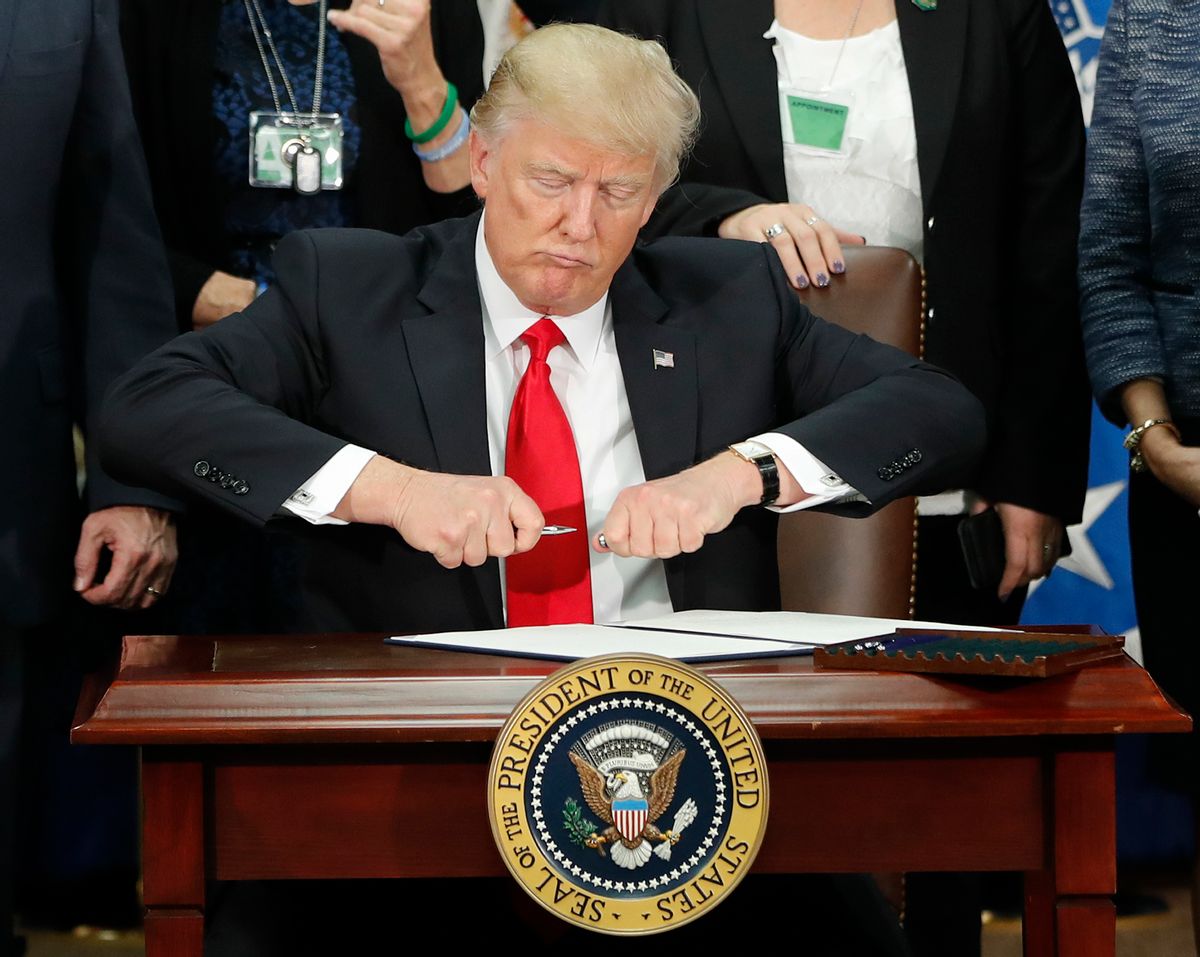The union representing 11,000 Department of Homeland Security employees who screen foreign refugees and asylum seekers has filed a Supreme Court brief saying President Trump’s decision to freeze the refugee program is ill-informed and contradicts the country’s heritage of admitting immigrants fleeing war and prosecution.
“You’ll notice we didn’t weigh in on ‘It’s racist,’ ‘It’s unconstitutional,’” said Michael Knowles, president of National Citizenship and Immigration Services (CIS) Council 119, speaking of Trump’s decrees that are generally referred to as the Muslim travel ban. “It’s not that we don’t have views about that. But our particular piece of the story is this is who we are, this is what we do. We do it very well. We deserve to be supported to do it even better, not dismantled or put shackles on us.”
“Our whole agency was created in response to 9/11,” Knowles said. “There’s no need to shut us down or say, ‘You know what, we just won’t take anybody from these six countries because it’s too hazy.’ Well, it’s even hazy if you bring in somebody from the U.K. Ultimately, you never know exactly who people are, but we do a pretty good job of finding out. I think we have had a pretty good track record in the refugee program.”
The union’s legal brief comes as the Supreme Court next month will hear the White House’s appeal of a lower court ruling blocking an executive order that suspended the International Refugee Assistance Program and cut to 50,000 the number of 2017 refugees. Its stance is a sharp counterpoint to the unions representing ICE officers and border patrol agents, which endorsed Trump's candidacy in 2016 and work with IRAP officers in the field.
However, the White House has signaled it will not restore the refugee program, the New York Times reported. This summer, Trump's senior policy advisor Stephen Miller suppressed the public release of an administration report that found refugees generate billions of dollars for the national economy, in contrast to Miller's assertions they cost taxpayers money and pose security threats.
Knowles' union, representing 11,000 officials who issue business visas and green cards and vet refugees and asylum seekers, is among several for Homeland Security Department employees. DHS was formed after 2001’s terrorist attacks, when the former Immigration and Naturalization Service, which was part of the Justice Department, was split into four sections. They are: Immigration and Customs Enforcement (ICE), which investigates, detains and prosecutes visa-less migrants; Customs and Border Protection (CDP), which controls air, sea and land port of entries; the Border Patrol, which is a subgroup of CDP; and Citizenship and Immigration Services.
Trump issued a series of executive orders barring travelers from six Muslim counties and refugees soon after taking office, prompting coast-to-coast protests and court challenges, with a string of federal judges ruling against the orders. However, Trump’s decrees shut down the refugee program in February. The refugee and asylum program did not resume looking at applications until August, Knowles said.
Knowles fears the administration could effectively shut down the refugee program, which typically takes one to two years to vet applicants, according to its Supreme Court brief. He believes the order freezing the program was ill informed and runs counter to history, where with several notable exceptions, war refugees were admitted. (The exceptions include Franklin D. Roosevelt’s refusal to admit Jews on the eve of World War II.)
The union’s brief sought to put the refugee and asylum program into a historic context.
“USRAP, a consortium of several federal agencies responsible for identifying and admitting refugees for resettlement into the United States, is a shining example of the longstanding American tradition of offering safe haven to those fleeing persecution because of their race, religion, nationality, political opinion, or membership in a particular social group,” it opened. “America has offered its protection to the world’s most vulnerable since its inception, and has allowed nearly five million refugees to resettle on its land since World War II. Our Nation’s assistance to displaced people throughout the world, particularly through the work of USRAP, allows our country to lead by example.”
No matter what the Supreme Court decides this fall, Knowles said Trump’s orders have significantly slowed the processing pipeline for refugees— a process many pro-immigration and refugee advocates previously said was insufficient under the Obama administration. Obama's White House envisioned admitting more than 100,000 refugees in 2017’s federal fiscal year, which runs from Oct. 1, 2016 to Sept. 30, 2017. Knowles said Trump’s cap, 50,000 refugees, was reached when he “hit pause.”
“At the point that they hit pause on us, we had already put into the so-called processing pipeline — the people already arrived or the people interviewed, and being vetted, having their medicals, finding sponsorships” — that threshold, he said. “We had enough people in the pipeline that we pretty much will meet the cap.”
Knowles, who is legally allowed to speak out on political issues as a union representative but not as a DHS asylum officer, said the union filed its Supreme Court brief because it felt Trump’s actions “reflects poorly on workers.” While that makes sense, Trump has repeated — incorrectly — that all federal immigration officials support him.
“Why do we care about it? We think it reflects poorly on workers,” Knowles said. “What we do is not only humanitarian and refugee protection. A very significant component to what we do is about national security. We’re not arresting people, but our decisions have the effect of keeping people out, or in the case of the asylum program, where people are already here, of letting them stay … This has to be seen in a historical perspective.”
As important as refugee and asylum issues are, that perspective now includes a union representing 11,000 federal law enforcement officials criticizing President Trump.




Shares